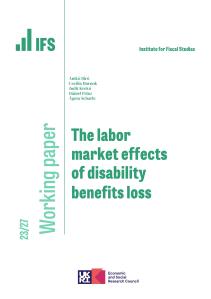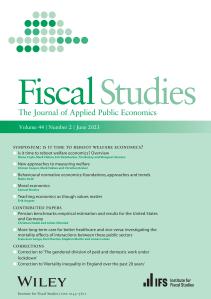On the eve of the economic crisis caused by the public health response to coronavirus, around 76,000 working-age families were subject to the benefit cap. The cap means that most of these families, and some of those who have since lost employment during the crisis won’t benefit at all from the temporary increases in benefits announced by the Chancellor. The cap provides a strong financial incentive for families to move into paid work or to move to cheaper housing; but this is less important, and in many cases undesirable, at the present time. Raising or removing the cap so that all working age benefit recipients can benefit from the temporary increase in support would make sense, at least while the current social distancing requirements are in place.
Main article
A substantial package of measures has been announced in response to the Covid-19 outbreak to support public services, household incomes, and employers. A key part of this has been temporary increases in the generosity of the benefit system, in particular a £1,000 increase in the standard allowances in universal credit, with equivalent increases for claimants who have not yet moved across to universal credit, and restoring the link between housing benefit and the 30th percentile of local rents for most private sector tenants, both for one year.
Increasing the level of the means-tested safety net makes sense at the present time: the government is trying to shield large numbers of families from hardship as they lose jobs or see falls in income; concerns about financial incentives to work are less relevant when the demand for labour is weak; and incentivising individuals to seek paid work would, in many cases, be contrary to efforts to promote social distancing.
However, overall benefit income for a working-age family is capped at a level that varies by the type of family and whether they live inside or outside Greater London. For those in couples or who have children the cap is set at £20,000 for those living outside London and £23,000 for those living in Greater London. For those who live alone the cap is set at a lower level: £13,400 for those living outside Greater London and £15,410 for those living in Greater London. The caps means some families are not reached by the temporary increase in the safety net. This will include most of the 76,000 families already subject to the cap on the eve of the crisis. Some of those who have moved out of paid work since the crisis began will also be affected by it: specifically, those who had not been continuously employed for the 12 months prior to that (and who therefore do not qualify for a 39-week exemption from the cap).
The families who will find themselves capped live in high-rent areas and/or have several children – both of which bring above-average living costs that are clearly very difficult to adjust quickly in light of a sudden job loss, but which the benefits system is saying it will take limited account of. The increases in benefits announced for this year will also bring additional households into scope of the cap, meaning that they will benefit less than fully.
The benefit cap acts to increase the financial payoff from moving into paid work or to a cheaper home. The evidence suggests that, in normal times, a small minority do respond in this way. But encouraging families to respond in this way is likely to be less effective, and indeed in many cases potentially harmful, at the present time. There is therefore a strong case for a lifting of the cap for the period in which benefits have been made more generous, or at least while the social distancing guidance is in place.
Robert Joyce, Deputy Director of the Institute for Fiscal Studies, said:
“The Government has implemented a substantial temporary increase in the generosity of the welfare safety net. But the overall cap on how much a working-age family can receive in benefits will mean that those increases will not benefit most of the around 76,000 families who were already capped on the eve of the crisis, as well as a small fraction of the large number who appear to have lost employment during the crisis. At the present time encouraging families to move into paid work, or to cheaper housing, is less of a priority. The Government should therefore temporarily raise or remove the cap.”










